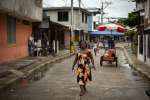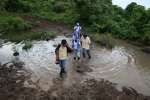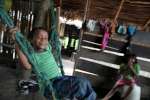Statement: António Guterres, UN High Commissioner for Refugees, on Colombia's Peace Talks
Statements by High Commissioner, 11 June 2015
I am concerned at the recent armed clashes amidst the ongoing peace talks in Colombia. After decades of unrest, millions of displaced persons in Colombia have longed for peace, pinning hopes on a negotiated settlement. These latest incidents have the potential to derail the long sought peace process, increasing risks for the civilian population.
Any disruptions in the peace process could jeopardize its chances of arriving at a positive outcome. I encourage both parties to move forward with negotiations and hope that the talks that have been taking place in Havana since 2012 will soon result in a peace agreement.
Protecting the civilian population from the consequences of conflict is critical to end the loss of human lives. I welcome the recent agreements that aim to establish a truth and justice commission, stop child recruitment and start demining activities in Colombia's Department of Antioquia. These steps open the doors to finding solutions for displaced populations.
Progress on key aspects of the negotiation agenda, the agreements reached so far and the participation of victims in the talks are significant achievements that can make the difference between war and peace.
These steps represent hope and help alleviate the suffering of Colombian refugees and internally displaced people, enabling them to restart their lives in their places of origin, integrate with host communities, or safely relocate to other parts of the country. Solutions should be found in a way that guarantees the safety and dignity of refugees and people displaced inside Colombia.
I am confident that the rights of displaced people and refugees will be duly considered in the dialogue. UNHCR remains ready to support the process in light of its experience with similar mechanisms in different parts of the world.
I firmly hope that the ongoing negotiations will soon lead to a historic opportunity for the country to overcome adversity. UNHCR stands by the people of Colombia in their quest to achieve a lasting peace.
2014 UNHCR Nansen Refugee Award
UN High Commissioner for Refugees António Guterres presented the Colombian women's rights group, Butterflies with New Wings Building a Future, with the prestigious Nansen Refugee Award in Geneva, Switzerland, on Monday night.
The volunteer members of Butterflies risk their lives each day to help survivors of forced displacement and sexual abuse in the Pacific Coast city of Buenaventura. This city has some of the highest rates of violence and displacement due to escalating rivalries between illegal armed groups.
Drawing on only the most modest of resources, volunteers cautiously move through the most dangerous neighbourhoods to help women access medical care and report crimes. This work, deep inside the communities, helps them reach the most vulnerable women, but also brings with it danger and threats from the illegal armed groups.
The Award ceremony, in its 60th year, was held in Geneva's Bâtiment des Forces Motrices, and featured musical performances by UNHCR supporters, Swedish-Lebanese singer-songwriter Maher Zain and Malian singer-songwriter Rokia Traoré. The Mexican acoustic guitar duo Rodrigo y Gabriela also performed at the ceremony.
2014 UNHCR Nansen Refugee Award
Nansen Refugee Award: Butterflies with New Wings
In a violence-ridden corner of Colombia, a group of courageous women are putting their lives at risk helping survivors of displacement and sexual violence. In a country where 5.7 million people have been uprooted by conflict, they live in one of the most dangerous cities - Buenaventura. Colombia's main port has one of the highest rates of violence and displacement, due to escalating rivalries between armed groups. To show their power or to exact revenge, the groups often violate and abuse the most vulnerable - women and children.
But in Buenaventura, the women who make up "Butterflies" are standing up and helping the survivors. They provide one-on-one support for victims of abuse and reach into different communities to educate and empower women and put pressure on the authorities to uphold women's rights.
Many of Butterflies' members have been forcibly displaced during the past 50 years of conflict, or have lost relatives and friends. Many are also survivors of domestic and sexual violence. It is this shared experience that pushes them to continue their work in spite of the risks.
On foot or by bus, Gloria Amparello , Maritza Asprilla Cruz and Mery Medina - three of the Butterflies coordinators - visit the most dangerous neighbourhoods and help women access medical and psychological care or help them report crimes. Through workshops, they teach women about their rights and how to earn a living. So far, Butterflies volunteers have helped more than 1,000 women and their families.
Butterflies has become a driving force in raising awareness about the high levels of violence against women. Despite attracting the attention of armed groups, they organize protests against abuse of women in the streets of their dilapidated city, determined to knock down walls of fear and silence.
Nansen Refugee Award: Butterflies with New Wings
Struggling with the threat of extinction
Among Colombia's many indigenous groups threatened with extinction, few are in a riskier situation than the Tule. There are only about 1,200 of them left in three locations in the neighbouring departments of Choco and Antiquoia in north-western Colombia.
One group of 500 live in Choco's Unguia municipality, a strategically important area on the border with Panama that is rich in timber, minerals and other natural resources. Unfortunately, these riches have attracted the attention of criminal and illegal armed groups over the past decade.
Many tribe members have sought shelter in Panama or elsewhere in Choco. But a determined core decided to stay, fearing that the tribe would never survive if they left their ancestral lands and gave up their traditional way of life.
UNHCR has long understood and sympathized with such concerns, and the refugee agency has helped draw up a strategy to prevent displacement, or at least ensure that the Tule never have to leave their territory permanently.
Struggling with the threat of extinction


Colombia: Helena Christensen gets to know Maribeth for World Refugee Day 2015
The Danish photographer visited UNHCR's work in Colombia and met with women who show great strength and courage in one of the world's most protracted conflict-ridden hot spots.
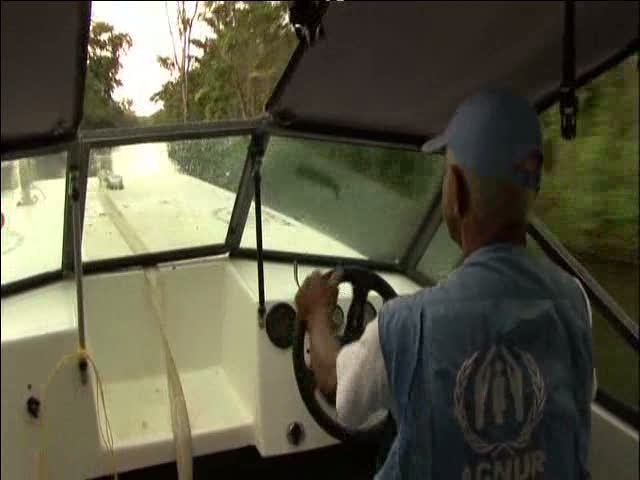

Colombia: Indigenous People Under Threat
Violence in parts of Colombia is threatening the existence of the country's indigenous people. This is the tale of one such group, the Tule.
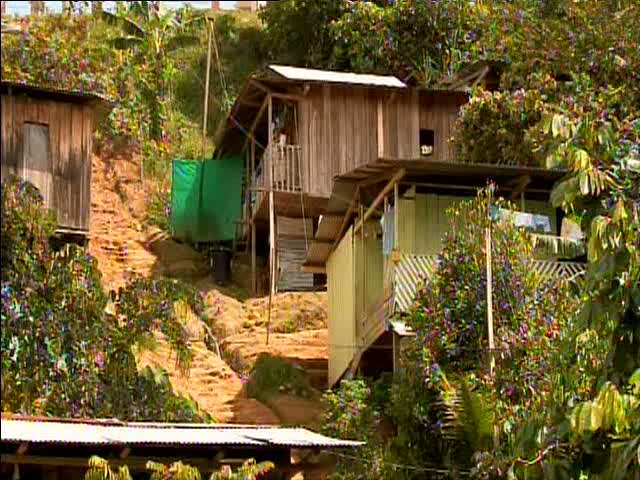

Colombia: Giving women strength
In the volatile southern Colombian region of Putumayo, forced displacement remains a real and daily threat. Indigenous women are especially vulnerable. A project by UNHCR focuses on helping women to adapt and learn about their rights while they are displaced.














